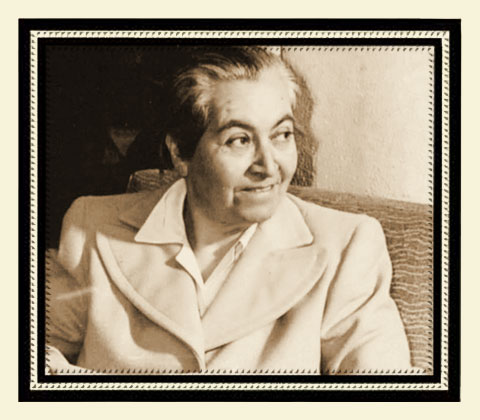Vicuña, Chile, 1889 — New York, 1957
Poeta, Prêmio Nobel de Literatura
Lucila María del Perpetuo Socorro Godoy Alcayaga was born in a village in the north of Chile and began to work as a primary school teacher at the age of 15. Her fiancé’s suicide in 1907 marked her life and work. Writing under the pseudonym Gabriela Mistral, an homage to her favourite poets, the Italian Gabriele D'Annunzio and the Provençal Frédéric Mistral, became famous upon winning the poetry contest Juegos Florales in Santiago, with Sonetos de la muerte, in 1914. Her first book of poetry, Desolación, in 1922, included the poem “Dolor”, in which she spoke of the loss of her fiancé.
As well as collaborating on the reforms of the educational systems of Mexico and Chile, she was Chilean consul in Naples, Madrid, Lisbon and Rio de Janeiro. In 1945 she won the Nobel Prize for Literature. She lectured in Spanish literature at Columbia University and died in New York state.
Although during the International Congress of PEN Clubs held in Buenos Aires in 1936, Zweig spent time with Gabriela Mistral’s great friend, the Argentinian writer and cultural agitator Victoria Ocampo, by all accounts his encounter with the Chilean poet took place in Rio in 1940, just before his second trip to Buenos Aires. Gabriela was then the Chilean consul in the federal capital, and they were introduced by Cuba’s plenipotentiary in Brazil, the writer Alfonso Hernandez Catá, with whom Zweig had a strong friendship. They met again that year, also because of Catá, but this time it was a particularly sad occasion, presided over by chancellor Oswaldo Aranha – the posthumous homage to the diplomat Catá, who had just died in a terrible air disaster on Botafogo beach. Zweig spoke on behalf of European writers and Gabriela Mistral on behalf of Latin American authors. The only photo in existence of Gabriela Mistral and Stefan Zweig was taken on that occasion.
When Gabriela Mistral moved from Niterói to Petrópolis, the friendship between the two grew, and during Zweig’s second trip to Argentina he met several of the Chilean poet’s friends, among them the writer and journalist Eduardo Mallea, who was also a collaborator and friend of Victoria Ocampo. Installed in Petrópolis in 1941, Stefan and Lotte visited the poet at her house, and she also visited the Zweig’s, with her nephew and her secretary.
Gabriela Mistral was told by phone of the Zweigs’ death a few hours after the suicide, by the writer and diplomat Domenico Braga, a frequent visitor to Petrópolis and a friend of them both. She went straight to the bungalow on Rua Gonçalves Dias in time to see the couple’s bodies still lying on the bed. Moved by the macabre sight, she wrote a long letter to their mutual friend Mallea, who was then editor of the literary supplement of the prestigious Argentinian newspaper La Nación. This was published in its entirety in the edition of 3rd March 1942. She also sent an extremely favourable review of Mallea’s book, which Zweig had given her a few weeks previously. The poet’s account provides some of the most lovely and moving pages written about Stefan Zweig’s death.
Address listed: Estrada Independência 2025, Petrópolis. Tel. 2751.
